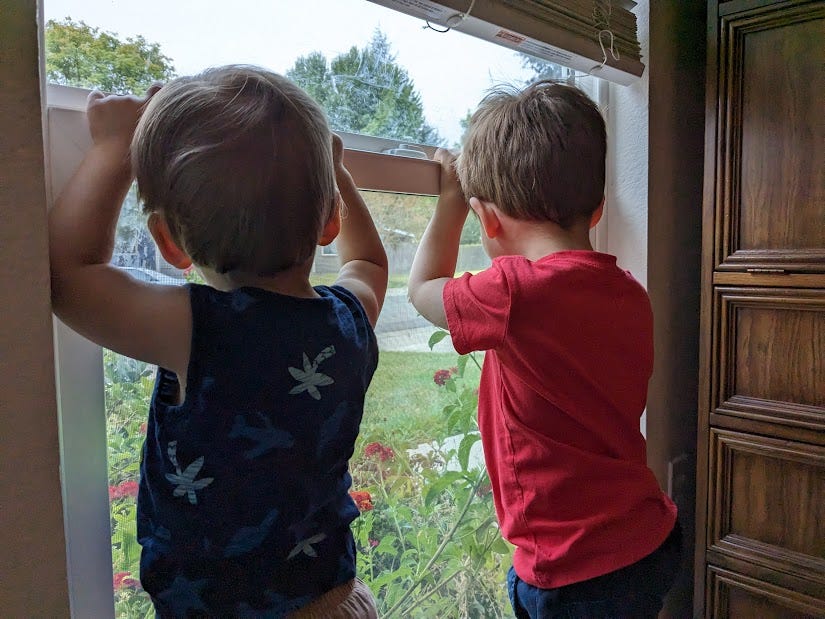007. Wondering While Wandering—October '23

Do It Again!
What we can learn from a childlike delight in repetition
At 3 and 1 years old, my boys are at the age where everything I do needs to be something I’m willing to repeat ten, a hundred, or a thousand times simply because it surprised, delighted, or amused them and they want to immediately experience it again.
It might be a physical activity like picking one of them up and spinning them around. It could be the way that I say a word wrong or a funny face that I make. Perhaps it’s a variant of peekaboo or maybe it’s a little game that we’ve invented right then and there. At any point, cries of “Again! Do it again!” from the older one and shrieks of delight and claps for more from the younger might break out, signaling that a repeat performance is requested, nay, demanded by my audience of two.
Occasionally I’ll realize I’ve made a mistake in making something I don’t really want to repeat in this manner too fun or interesting when I first did it. “Oh boy,” I think to myself as I’m forced to choose between dancing like a court jester to the delighted cries and applause of the boy princes or facing the other sorts of cries—not of delight, but the ones accompanied by tears—if I refuse to repeat my ridiculous reactions.
But I do it anyways. I make a fool of myself and go on like a broken record or an instant replay at a sporting event stuck on a loop. Again. And again. And once more, this time with feeling. Why? Because I love these boys dearly and would do anything to bring them delight and joy.
A recent occurrence of this very scenario brought to mind the passage in G.K. Chesterton’s Othrodoxy where he compares this childlike delight in monotony to God’s own behavior:
Because children have abounding vitality, because they are in spirit fierce and free, therefore they want things repeated and unchanged. They always say, “Do it again”; and the grown-up person does it again until he is nearly dead. For grown-up people are not strong enough to exult in monotony. But perhaps God is strong enough to exult in monotony. It is possible that God says every morning, "Do it again" to the sun; and every evening, "Do it again" to the moon. It may not be automatic necessity that makes all daisies alike; it may be that God makes every daisy separately, but has never got tired of making them. It may be that He has the eternal appetite of infancy; for we have sinned and grown old, and our Father is younger than we.
I have always loved this picture Chesterton paints of God saying, “Do it again,” to the sun and moon, making each flower separately and yet never tiring of making them precisely the same way. Now I love this picture even more, as I have the daily experience of cries of “Do it again!” from my boys ringing out between peals of laughter and squeals of delight.
Perhaps this delight in the monotonous is a small aspect of what Jesus is alluding to when he says to his disciples in Matthew 18:3, “Truly, I say to you, unless you turn and become like children, you will never enter the kingdom of heaven.”
What could be more “monotonous” than praising God for his goodness, holiness, and greatness for all eternity in unceasing praise? Singing “Holy, holy, holy is the Lord God Almighty, who was, and is, and is to come” day and night without ceasing? And yet that is the picture we are given in Revelation 4 of the throne room of heaven and therefore the end to which our faith is bringing us.
Those of us who are too grown-up to “exult in monotony” may find that very picture of heaven tedious, too proud to submit to endless repetition or consider that there may be delight hidden in the seeming drudgery.
Perhaps becoming like a child and humbling ourselves means abandoning a relentless pursuit of amusement in the novel and reconsidering the ordinary, the repetitive, the humdrum and the monotonous.
The next time my boys cry “Do it again!” may it remind me again of the delight God takes in every sunrise, the tender care he puts into each and every lily (and daisy) of the field.
May we each recapture a bit of childlike wonder, even and especially in the repetition of our routines and rhythms. As we await the next sunrise or watch the evening sky fade to black while the Moon, the Evening Star, and the constellations emerge once more from the shadowy dusk, may we cry in delight to our Father, “Do it again!” and take joy in his repetition of these everyday yet wondrous occurrences.
Funnies
Speaking of repetition…
I love the way kids use their vocabulary to express things.

This is our 1-year-old for sure!
Kid Corner
Reading, Listening, or Watching
Loki—season 2 of Loki has been interesting and enjoyable so far, as revelations about the true nature of the Time Variance Authority has led to a sort of deconstruction among many of the faithful members of this fictional temporal agency. There’s been themes of destiny vs. free will as well: lots of interesting themes to be considering as we watch!
If you’re also watching and interested in some excellent commentary, Aaron Earls of
is doing a recap and analysis series here on Substack I’m enjoying.Frasier (2023)—everyone’s favorite radio psychiatrist is back for a revival of the beloved show. Originally a member of the Cheers ensemble and then headlining his own spinoff, the revival forms a sort of third act for the titular Frasier. In a similar way that 1 Peter gives us a peek at an epilogue of Peter’s life or Indiana Jones and the Dial of Destiny does for Indiana Jones, we get a glimpse of how life has turned out for Frasier as he grapples with his legacy and the results of his life choices so far.
In a role reversal, instead of being the son who is reconnecting with his father like in Frasier, he’s now the father reconnecting with his son, Freddie. In the closing moments of the first episode, he tells his son, “If there’s anything I’ve ever wanted to be in life, more than anything else, it’s to be a good father.” A poignant scene and a desire I couldn’t help but identify with.
We’ve enjoyed the episodes so far (though they haven’t yet reached the heights of Frasier, they’ve been enjoyable) and what we’ve seen so far is enough for us to keep watching through the rest of the season.
Life on the Vine by Philip D. Kenneson—we finished our read-through of this book this month and the final chapter was on self-control. It was an excellent chapter, in part because Kenneson reframed the idea of self-control from a Christian perspective. If “self-control” is truly a fruit of the Spirit, shouldn’t it mean something different than self-mastery? Indeed, its meaning for the Christian must mean “something akin to ‘control of the self by the Spirit for the sake of the gospel.’”
In sum, the desires of the self are most determinatively ordered not when we strive most diligently to bring the self under control but when we use our freedom in the Spirit to become servants of God and our neighbors.
I appreciated this reframing of self-control, especially since there’s a certain irony in the whole idea of self-control if you believe that the old self is a critical part of the problem! “It’s me, hi, I’m the problem, it’s me.”
That’s all for this Wondering While Wandering! Thank you as always for reading and caring.
For discussion: what are you enjoying, reading, watching, learning, etc?





